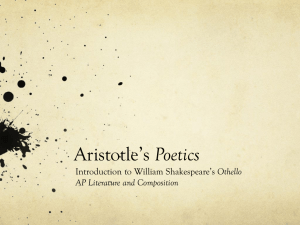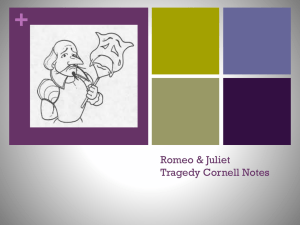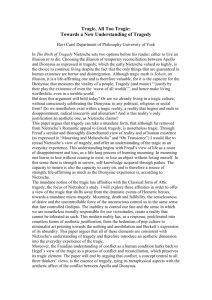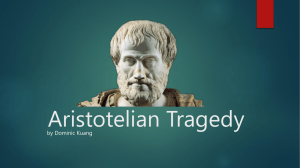On the tragic and its limits
advertisement
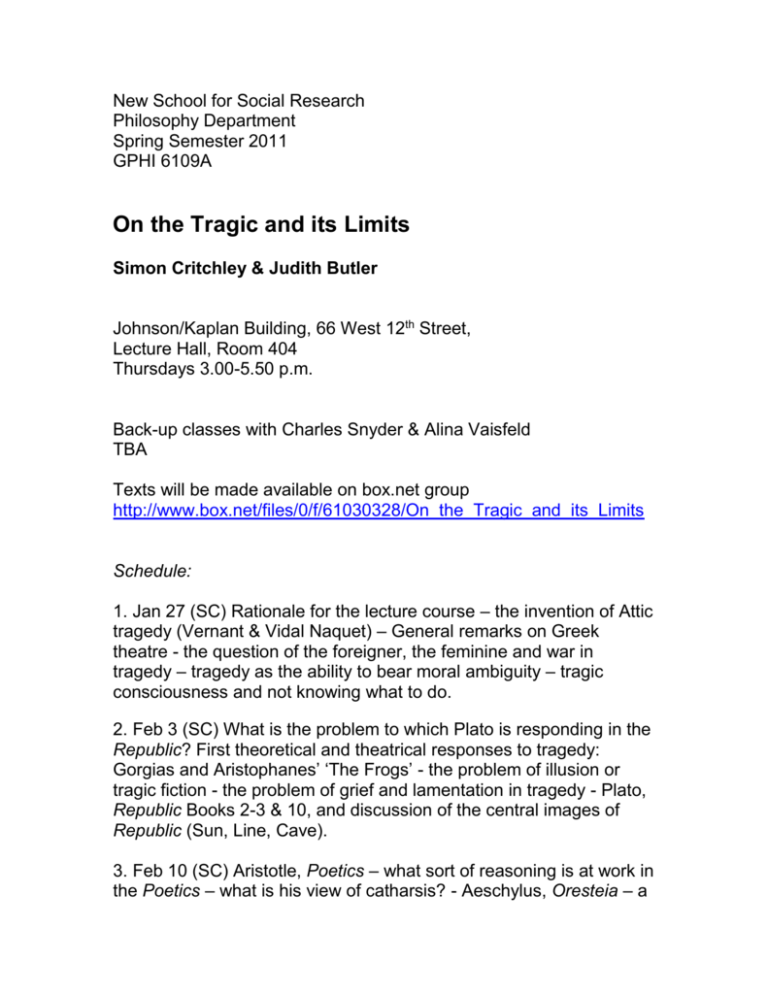
New School for Social Research Philosophy Department Spring Semester 2011 GPHI 6109A On the Tragic and its Limits Simon Critchley & Judith Butler Johnson/Kaplan Building, 66 West 12th Street, Lecture Hall, Room 404 Thursdays 3.00-5.50 p.m. Back-up classes with Charles Snyder & Alina Vaisfeld TBA Texts will be made available on box.net group http://www.box.net/files/0/f/61030328/On_the_Tragic_and_its_Limits Schedule: 1. Jan 27 (SC) Rationale for the lecture course – the invention of Attic tragedy (Vernant & Vidal Naquet) – General remarks on Greek theatre - the question of the foreigner, the feminine and war in tragedy – tragedy as the ability to bear moral ambiguity – tragic consciousness and not knowing what to do. 2. Feb 3 (SC) What is the problem to which Plato is responding in the Republic? First theoretical and theatrical responses to tragedy: Gorgias and Aristophanes’ ‘The Frogs’ - the problem of illusion or tragic fiction - the problem of grief and lamentation in tragedy - Plato, Republic Books 2-3 & 10, and discussion of the central images of Republic (Sun, Line, Cave). 3. Feb 10 (SC) Aristotle, Poetics – what sort of reasoning is at work in the Poetics – what is his view of catharsis? - Aeschylus, Oresteia – a dialectical reading and that which resists it – the figure of Cassandra (Christa Wolf). 4. Feb 17 (JB) Sophocles, Antigone, the relation between grief, rage and the problem of the law (cf. Wilmer and Zukauskaite, Interrogating Antigone in Postmodern Philosophy and Criticism). 5. Feb 24 (SC) Sophocles, Oedipus the King and Oedipus at Colonus. - The problem of Euripides (Anne Carson on Euripides and Nietzsche on The Bacchae) 6. Mar 3 (JB) Lacan, selections from Seminar VII, The Ethics of Psychoanalysis; Irigaray, “The Eternal Irony of Community” and “Between Myth and History”; Nicole Loraux, Mothers in Mourning and Tragic Ways of Killing a Woman - Does community overcome violence or require it? - How do women factor into this problem as both necessary and excluded? 7. Mar 10 (JB) Aeschylus, Agamemnon; Freud, Civilization and its Discontents, Chapter VII (justice and revenge); Melanie Klein and Joan Riviere, Love, Hate, and Reparation. What is the difference between justice and revenge, and does the distinction hold? 8. Mar 17 Spring Break 9. Mar 24 (SC) Hegel, Aesthetics – art as the sensuous presentation of the absolute – art as subordinate to philosophy – art as a thing of the past – the place of drama in Hegel’s philosophy of art – the nature of tragedy, ancient and modern – the overcoming of tragedy in comedy and the passage to philosophy as the prose of thought. 10. Mar 31 (SC) The Tragical Sublime – Longinus, Schelling and Hölderlin - the sublime and the monstrous – union with the god, separation and disgust – discussion of Aeschylus’ Prometheus Bound, Hölderlin, The Death of Empedocles, and Ibsen’s John Gabriel Borkman. 11. Apr 7 (SC) Nietzsche, The Birth of Tragedy I – Heidegger’s interpretation of Nietzsche – Heidegger’s interpretation of the Antigone. 12. Apr 14 (JB) Nietzsche, The Birth of Tragedy II – ‘Attempt at SelfCriticism’ – The distrust of the Dionysian in the early formulation – implications for thinking about the terror and sublimity of war. Is war a form of seduction? 13. Apr 21 (JB) Tragedy, minoritization, and urban kinship: screening of two films beforehand: “Strella” – a contemporary Greek film on transgender and Sophocles, plus discussion; and “Black Orpheus” 1959 Brazilian film, drawing on Euripides, directed by Marcel Camus; discussion. What happens when tragedy is replayed in light of new political and social forms of kinship and relationality? What is lost and what is gained? Can tragedy become historical? 14. Apr 28 (SC) Racine, Phaedra – the problematic of desire – Ibsen, Hedda Gabler and Ghosts – Lethargy, impossibility, conscience, guilt – ‘Life isn’t tragic, it’s ridiculous and that is what cannot be borne’ – perhaps even a mention of Beckett. 15. May 5 (JB) No class – The Anarchist Hypothesis conference will be running throughout May 5-6. Speakers include Judith Butler, Miguel Abensour, Todd May, members of the accused from Tarnac and many others. 16. May 12 (SC, with Jamieson Webster) Shakespeare, Hamlet – The problem of nothing in Hamlet or Hamlet’s nihilism - Lacan on Hamlet (this coincides with a screening and discussion of different cinematic versions of Hamlet at the New York Psychoanalytic Instiute on May 13th) – Carl Schmitt on Hamlet – brief discussion of Benjamin’s Trauerspiel and the problem of tragedy and history.
